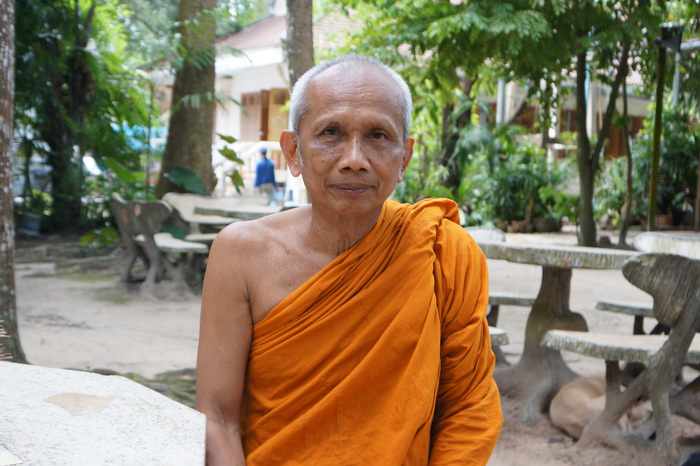Phuket Opinion: Spending a lifetime teaching simplicity

Phra Visutthi Thamma-kanee, 64, is the head of Phuket’s monks and the abbot of Tah Rua Temple in Thalang. He has been in the monkhood since he was 17 years old. He took up the position of acting head of the island’s monks in 2006 and has been their leader since 2008.
Here, he talks about what men can gain from becoming monks during Khao Pansa, the three-month ordination period currently taking place.
PHUKET: I never thought I’d become a monk. My plan was to be ordained for two months to make merit for my parents. But I enjoyed learning and had the chance to study theology in depth. My master asked me to stay on for one more year, so I did. I had a lot to learn. Time passed, and I became a master myself, and then they said, “Why don’t you stay and teach with us? There are plenty of lay teachers out there. We need you here.” So I stayed, and taught monks, and this is what I’ll do for the rest of my life.
Khao Pansa is an opportunity for men to be ordained and study Buddhist principles. We Thai believe that becoming a monk is a chance to pay back our parents for everything they’ve done for us by making merit for them.
Nowadays, men have other obligations, like studying and working, so many of them prefer to be ordained for a shorter time, maybe 10-15 days. Each person has to choose the time that’s right for them, but it’s best if they can come for three months because it allows more time to learn and practice.
Monks live a simple life. We use three pieces of cloth to cover ourselves and protect us against heat, cold, nakedness and bugs.
We shave our heads and eyebrows so we won’t be concerned about how we look, and to make it easy to take care of ourselves. That doesn’t mean we let ourselves go – we just focus on being clean and neat.
Monks wake up early to be ready for morning prayers at 4 o’clock. I get up even earlier, at 2am, to pray by myself.
At 6am we go out to collect food offerings, and after that we come back to the temple to eat, pray, study, meditate and clean the grounds. We don’t eat after lunchtime, and at 5pm we pray again.
New monks need to adjust to doing things that they don’t normally do, like praying, eating less often and doing things on a schedule, but most get used to it quickly and don’t have a problem adapting. They wanted to come here and do these things, after all.
However, just like in any society, there are good and bad people in the monk community. Some novitiates are forced to come here by their parents. For some, our lifestyle is uncomfortable.
We don’t have big punishments for those who don’t follow our instructions. It’s up to them if they want to follow good or bad. We can’t force them. We just give them a warning and send them off after three months.
The way we see it, people are animals that can be trained. While the novitiates are with us, we try to help them develop themselves. Then, when they go back to their lives, they can use what they’ve learned to benefit themselves, their families and the country.
We teach physical, moral, emotional and intellectual development.
Physically, we must take care of ourselves. We use our bodies every day, all our lives. The healthier we are, the better.
Our moral lesson is: don’t make trouble for others or for yourself. If we all do this, we can make the world a more peaceful place.
As for emotions, we advise against extremes, both good and bad. They can be harmful to your well-being. If you can control your feelings and keep them in the middle, you will be carefree.
Intellectual development means knowing three things: what good is, what bad is and knowing how to avoid bad and do good.
If everyone practiced doing these four things, we’d live in a better world.
Latest Thailand News
Follow The Thaiger on Google News:


























